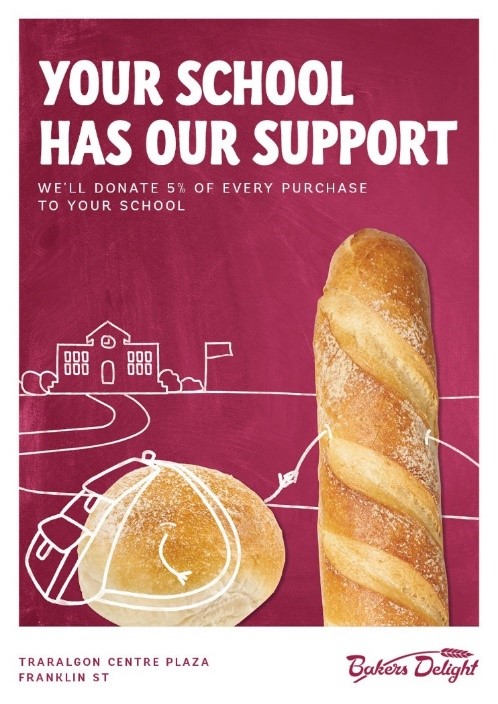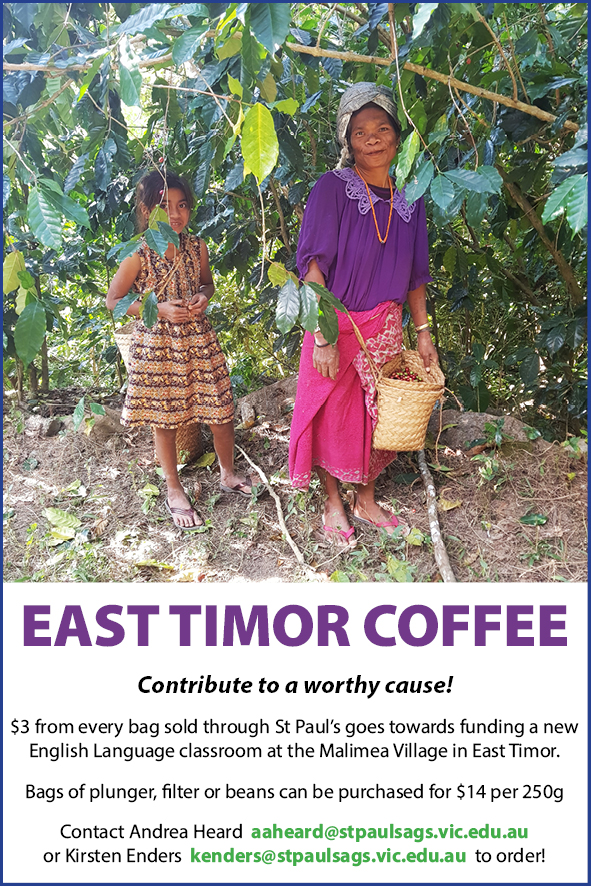Traralgon Junior School

From the Head of Traralgon Junior School,
Ms Tracey King.
Welcome to Term 2!
Welcome back to another exciting term in our Junior School. We are thrilled to welcome our students and families back to campus for Term 2. After a well-deserved break, it is time to dive back into the rhythm of learning, growth and discovery. It is a time for setting goals, exploring new subjects and embracing fresh challenges.
Students are encouraged to approach the new term with curiosity, enthusiasm and a willingness to learn. Our students can look forward to a wide range of exciting opportunities both inside and outside the classroom. From engaging lessons and creative projects to co-curricular activities and special events, there is something for everyone to enjoy and explore.
At St Paul’s we believe in the power of community. Together, we create a supportive and inclusive environment where every student feels valued, respected and empowered to succeed. As we navigate the ups and downs of the term ahead, let’s remember to support and encourage each other.
Communication is key to a successful partnership between home and school. We encourage parents and guardians to stay connected with us throughout the term. Whether it is through our school newsletter, MyStPauls portal posts, parent-teacher conferences, or informal conversations, we value your input and involvement in your child’s education. Parents are encouraged to contact classroom teachers with any concerns or questions as needed.
As we embark on this new term together, I want to extend my warmest wishes to each and every one of you. May this term be filled with joy, growth and countless opportunities for learning and achievement. Welcome back, students and families! Let’s make Term 2 a memorable and successful chapter in our academic journey.
Behaviour Education
In our Junior School, we are focused on the journey of raising well-rounded individuals. Whilst schools often focus on academics, co-curricular activities and social development, one aspect that sometimes gets overlooked is behaviour education curriculum. This curriculum plays a pivotal role in shaping the character, values and social skills of children.
Behaviour education curriculum encompasses a range of topics aimed at fostering positive behaviours, attitudes and social interactions in children. It goes beyond teaching subjects like Mathematics or Science; instead, it focuses on nurturing qualities like empathy, responsibility, self-control and resilience. At Traralgon Junior School through our Play Is The Way program, structured lessons, discussions and activities, children learn to navigate social situations, manage their emotions and make ethical decisions.
Behaviour Education includes:
- Building Essential Life Skills
One of the key benefits of behaviour education curriculum is its focus on imparting essential life skills. In today’s fast-paced world, academic achievements alone are not enough to ensure success. Employers increasingly value soft skills such as teamwork, communication, problem-solving and adaptability. By integrating these skills into the curriculum, children are being prepared for the challenges they will face in their personal and professional lives.
- Fostering Empathy and Compassion
In a society that often emphasises individualism, cultivating empathy and compassion in children is more important than ever. Behaviour education curriculum teaches children to consider the perspectives and feelings of others, leading to more inclusive and harmonious communities. When children learn to empathise with others, they are less likely to engage in bullying, discrimination or antisocial behaviour.
- Promoting Ethical Decision-Making
Ethical decision-making is a cornerstone of responsible citizenship. Behaviour education curriculum helps children develop a strong moral compass by exploring ethical dilemmas, discussing values and reflecting on their actions. By encouraging critical thinking and introspection, students are empowered to make principled decisions even in challenging situations.
- Nurturing Resilience and Emotional Wellbeing
Life is full of ups and downs, and resilience is the ability to bounce back from setbacks and adversity. Behaviour education curriculum teaches children coping strategies, stress management techniques and positive thinking habits that promote resilience and emotional wellbeing. By equipping children with these skills, parents prepare them to face life’s challenges with confidence and optimism.
- Strengthening Family and Community Bonds
Behaviour education curriculum not only benefits individual children but also strengthens family and community bonds. By involving parents, teachers and community members in discussions and activities, parents create a support network that reinforces positive values, behaviours and morals. When families and communities work together to instil these values, children receive consistent messages about what it means to be respectful, responsible and compassionate members of society.
- Play is the Way Life Rafts
The life rafts provide a structure and guide for teachers and students to talk about behaviour and expectations.
These include:
1. Treat others as you would like to be treated – if someone is unlike you seek to understand them.
2. Pursue your personal best no matter who you work with – we do not come to school to be better than others – we come to school to better ourselves by being able to work with others.
3. It takes great strength to be sensible – we do the right thing because it is the best thing to do.
4. Have reasons for the things you say and do – if you do not know why you are doing something then do not do it because it is most likely wrong.
5. Be Brave – participate to progress – school is about stepping bravely into the unknown. The unknown is often uncomfortable. The braver you are the more you learn.
6. Be the master not the victim of your feelings
- Am I doing the right thing or the wrong thing?
- Am I making a strong decision or a weak decision?
- Are my feelings in charge of my actions or is my thinking in charge?
- Am I running away from the problem or am I dealing with it?
- Am I being my own boss or am I inviting an adult to be my boss?
- Is my teacher trying to help or hurt me?
Behaviour education curriculum is a vital component of raising socially responsible and emotionally intelligent children. By prioritising behaviour education alongside academics and co-curricular activities, our school is laying the foundation for student success and wellbeing in all aspects of life. Our teachers have high expectations regarding the behaviour of students in classrooms and in the playground and respond promptly to concerning behaviour to assist students to learn and grow. Consistent processes, expectations and use of language across the school is greatly beneficial for students as they work towards developing these behaviours and understandings. In a world that values integrity, empathy and resilience, behaviour education curriculum equips children with the tools they need to thrive as individuals and contribute positively to their communities.
We are excited to welcome Wilson and Julie McCaskill, creators of Play is the Way, back to our Traralgon Junior School in Week 4 for further professional development with our teaching team.
ANZAC DAY
ANZAC Day on 25 April is a significant date in our annual calendar. This is the anniversary of the day when Australian and New Zealand soldiers landed on Gallipoli in 1915 as part of the Allies’ invasion. ANZAC Day draws large crowds of people to the dawn services, and marches are held around the country. ANZAC Day is a time for all Australians to recognise the more than 1.5 million service personnel who served our country in conflicts, wars and peacekeeping operations. It is also a time to remember the over 103,000 Australians who sacrificed their lives in our country’s name.
ANZAC Day is a time for us to honour the courage and sacrifice of the brave men and women who served and continue to serve our country. It is an opportunity for us to come together as a community to reflect, pay our respects and teach our children about the importance of remembrance. This year we will acknowledge ANZAC Day on Wednesday 24 April with a special service at 10:30 am and parents are most welcome to join us. We encourage families to commemorate ANZAC Day in their own meaningful way, whether it is attending a local dawn service, participating in a moment of silence, or sharing stories of bravery and resilience with our children. Lest we forget.
Nude Food
Young people are becoming the champions of a more sustainable future as they realise that this future is their own. Our Junior School students are no exception and we have a passionate ‘Green Team’ who are keen to see our campus focus on sustainability practices. The team hopes that their small daily actions will contribute to a big and positive environmental change.
An initiative they are particularly passionate about is ‘Nude Food’. In our Junior School, we are encouraging students to keep their lunchboxes waste-free and containing food that is not wrapped in foil, plastic or commercial packaging.
Why nude food?
In the United States, the New York State Department of Environmental Conservation estimated that the average child taking a disposable lunch to school generates 30 kilograms of garbage per school year. With our busy lives and the convenience of pre-packaged lunch items and single-use wrappings like cling wrap, we are sure the statistics would be similar at home in Australia. A lot of this waste will end up in landfills. Our students are passionate about decreasing the amount of waste we as a school send to landfill and would also like to see less rubbish on our school grounds.
So how can you support your child and their care for creating a better world?
Preparation is key! With the right amount of foresight and organisation, the art of putting together your student’s nude food lunchbox will become a breeze.
This starts with getting the right lunchbox and containers. All-in-one lunchboxes with compartments are ideal or a couple of smaller containers held inside a lunchbox work well. We recommend having a solid collection of reusable containers.
Beeswax wraps and lunchskins are another environmentally conscious storage means that produce far less waste than single-use cling wrap.
Next up, it is time to ditch packaged food. Food wrapped in plastic is often heavily processed and low in nutrition. Instead, some easy alternatives could include homemade popcorn or cut-up fresh fruit. We recommend buying in bulk. Instead of plastic-wrapped cheese sticks, buy a large block of cheese and cut it into sticks or cubes, or instead of purchasing yoghurt squeezes opt for a large tub of plain yogurt that can be portioned into small containers.
For those time-poor among us, this is a fantastic way to give your student autonomy over their lunchbox. Allowing them to pack their nude food lunchboxes is a rewarding experience of independence and also leaves you less pressed for time.
While the overall goal from us as a school community is to reduce campus waste, we hope you see the value in teaching your student that small changes in their daily life can have huge impacts on their environmental and personal health.
URGENT – Child Safety in the Carpark – A ‘Priority’
As the days become shorter in the coming months there is an increased need to be even more alert when travelling throughout our school grounds in vehicles. Please adhere to the 10 kilometres per hour speed limit and ensure that all children are directed to use the supervised pedestrian crossings. Too often we witness cars traversing far too quickly throughout the bottom of the horseshoe and over the pedestrian crossing and through the Junior School carpark. We are increasingly concerned about parents and guardians parking on the grass opposite the flagpoles while signalling to children to cross the road. Little ones are particularly hard to see from a vehicle and very unpredictable in moving traffic as they struggle to safely estimate the speed of passing vehicles. We certainly do not want to see an avoidable tragedy unfold at our campus; the care of our community is everyone’s responsibility. We respectfully request that parents/guardians park in designated parking areas only. Please do not park or drive on our lawns/evacuation site opposite the flag poles adjacent to the main driveway between our two sub-schools. Students have been instructed to always use the school pedestrian crossings and not to cross the school driveway to get to their parents’ cars. Parent support to keep our little people safe is very much appreciated.
School TV report: Diet & Nutrition | St Paul’s Anglican Grammar School
Families today, with school-age children, have very busy schedules. This can sometimes make it hard to sit down to homemade meals every day when there is such an abundance of pre-packaged and processed food available. However, it is still important to teach your kids healthy eating habits. Diet and nutrition is crucial to your child’s development. Not only can it prevent many chronic diseases, but it also impacts on your child’s brain development and learning abilities.
There are many benefits to incorporating a healthy diet and good nutrition. It can stabilise your child’s energy, improve their mood and maintain a healthy weight. Not only will it improve their general wellbeing, but it can also have a positive impact on their mental health helping prevent anxiety, depression and ADHD.
Tracey King
Head of Traralgon Junior School
WHAT’S ON
APRIL
23 April Cross Country Carnival
24 April ANZAC Day Service 10:30 am
Regional Tennis competition
25 April ANZAC Day Public Holiday
30 April District Cross Country
MAY
1 May Years 3 and 4 Camp CYC The Island
Buddy Picnic
2 May Year 3 and 4 Camp CYC The Island
3 May Year 3 and 4 Camp CYC The Island
9 May Mother’s Evening Event 5:30 pm
10 May FOSP Mother’s Day Stall
Traralgon Secondary School Market Day for Years 3 to 6
State Individual Tennis
15 May Division Cross Country
16 May Education Support Staff Day
22 May National Simultaneous Storytime
Studio Concert
27 May Reconciliation Week
JUNE
4 June District Winter Sports
5 June World Environment Day
6 June Regional Cross Country
10 June King’s Birthday Public Holiday
12 June Buddy Picnic
14 June Student Free Day
18 June Classroom EXPOs 2:30 pm
20 June Division Winter Sports
Endeavour Showcase 2:30 pm
27 June Aladdin JR Musical 6:00 pm
28 June Boho Friday
End of Term dismissal 2:20 pm
CLASS UPDATES
Year 1
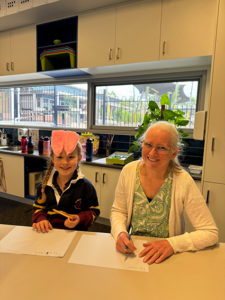
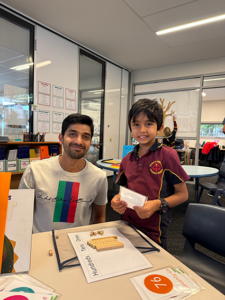
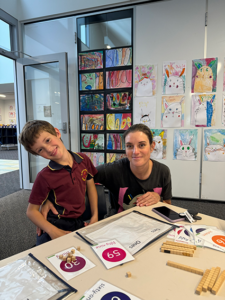
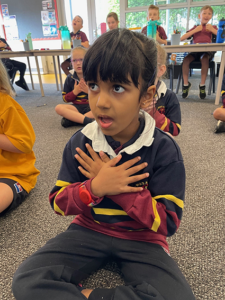
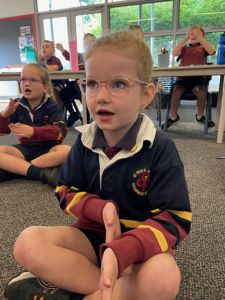
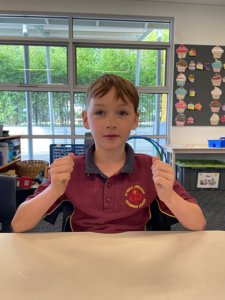
Year 2

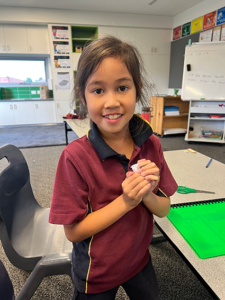

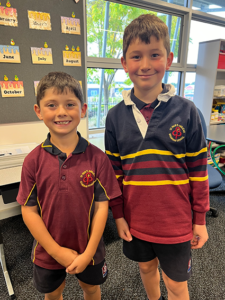
Year 3
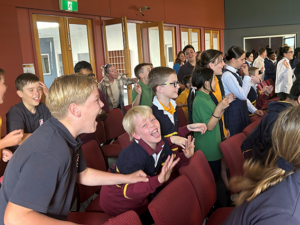
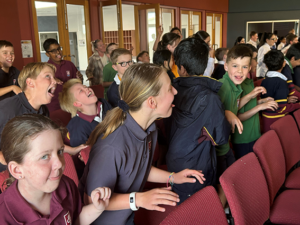
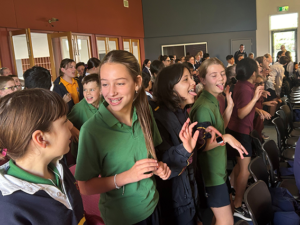
Year 4
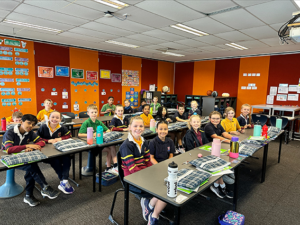

Year 5
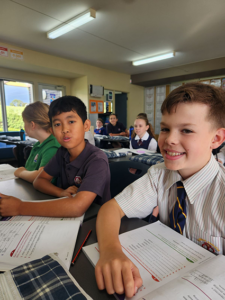
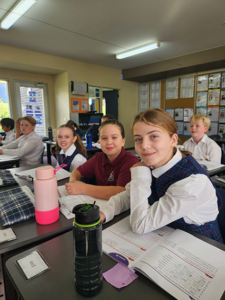
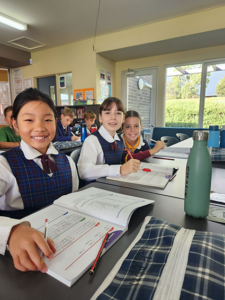
PRAYER GROUP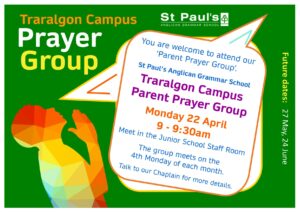
The Traralgon Parent Prayer Group starts up again on 22 April. All parents are welcome to attend. We meet in the Junior School staff room at 9:00 am and are finished at 9:30 am. Sign in at the Junior School Office and they will point you in the right direction.
If you cannot make it but would like to send through some prayer requests, or you would just like some further information, then please contact the Chaplain, Glen Treble.
Glen Treble
Traralgon Chaplain
DOBSONS TRADING HOURS

Order online or click and collect: Please ensure that you only attend the store to collect your items once you have received notification that your order is ready, order here.
Negative News in the Media
The tragic events in Bondi over the weekend have been confronting for many children, adolescents and adults to watch and hear about. As parents, you may be wondering how to approach not only this event, but the constant stream of negative news portrayed in the media, with your children.
Limit exposure: As adults, we are often able to identify when we have reached our threshold of negative news for the day and know to engage in self-care at this stage. Children and adolescents may not have this insight and they may not fully understand all that they are seeing/hearing. As such, limiting their exposure to news media can be beneficial. It is generally advised that news media access be actively supervised and never used as background noise. If you are watching or listening to the news as a family and hear a warning about distressing content, or a warning that something may not be appropriate for younger audiences, change to something suitable for the whole family.
Have a discussion: Even if you avoid the news, children and adolescents are likely to hear about recent events from their peers. To avoid confusion or misunderstandings about events, it is important to be proactive. If possible, prepare for any discussions and make sure that these occur at a time when you feel calm and regulated. Remember that children and adolescents often watch their parents for cues about how they should feel about situations. Ask your child what they have heard about recent events and correct any misinformation. Deliver age-appropriate information in a clear and honest manner. Sometimes programs like Behind the News can provide age-appropriate information to use as a springboard for further discussion. Remind your child that they can come to you with any questions they may have.
Ask your child how they are feeling: Seeing violent events on a screen can be as traumatic as witnessing them in real life, particularly for children and adolescents. It is important that you check in with your child about how they are feeling about recent events. Avoid statements that dismiss their feelings, and instead validate and normalise these. Offer appropriate reassurance, perhaps by reminding your child that such events are rare, that professionals/experts are managing the situation, or by providing context that helps them to understand that they are not at risk.
Watch out for signs of distress: Children and adolescents may not be able to verbally articulate if they are feeling distressed by what they have seen or heard in the media. It is important to maintain open communication with your child, as well as to watch for changes in their behaviour. Behavioural changes may include an increase in nightmares, sudden sleep reluctance, appetite changes, separation anxiety, withdrawal, emotional dysregulation or feeling unwell.
Maintain routines: Routines provide a sense of safety and security to children and adolescents. Keeping your family routine as consistent as possible is likely to be helpful during distressing times. Increasing connection and engaging with friends and family can also be beneficial.
Seek support: If your child seems distressed by something they have seen or heard, reach out for support. The St Paul’s Anglican Grammar School Counselling team is available to provide support to students in need. To arrange a session, speak to your child’s classroom teacher, Head of Year, or Deputy Head of School. Remember that services like Kids Help Line (1800 55 1800), Lifeline (13 11 14), Beyond Blue (1300 224 636) and Headspace (1800 650 890) are available to provide telephone and online support outside of school hours.
Shannon Staples
Head of Counselling Services
Senior Student Trip to East Timor – Ponilala
A recent senior student trip to the Ermera District of East Timor provided a glimpse into the life and traditions of the Timorese people, leaving a lasting impression of friendship and cultural richness. “The people I’ve made friends with, the Timorese and Aussies [fellow participants], will always be treasured.” (Asmi)
From the moment our group arrived, we were greeted with open arms by the friendly Timorese locals, “[they] remind you what it means to be grateful and happy” (India). Their warm smiles and genuine curiosity about our journey made us feel instantly welcomed and at home.
One of the highlights of our trip was our visit to Ponilala Secondary School (partly funded by St Paul’s in 2007). Ponilala is situated in the hills of Ermera, overlooking the large town of Gleno and its isolation excludes it from regular visitors. After a traditional welcome with open arms and warm hearts, we stepped into the Ponilala secondary classroom, a room in stark contrast to what our students were expecting; we were greeted with a sea of smiling eager students squeezed into old wooden desks, a chalkboard and sadly, a lack of resources.
The day kicked off with vibrant displays of traditional Timorese dancing and singing, showcasing the rich heritage and artistic talent of the community. In the spirit of cultural exchange and in somewhat of a contrast, our students reciprocated by sharing the familiar dance moves of Timber and the iconic Nutbush dance. The laughter and shared moments on the dance floor brought us together and created memories that will last a lifetime.
The delivery of the English/Tetun dictionaries kindly donated by so many generous St Paul’s families was met with overwhelming appreciation as you can see in the students’ faces! This simple act will have a profound impact on their English learning journey and was truly appreciated by the teaching staff as well, who were quick to ask for their own copies too.
Another special moment was the gifting of a beautiful guitar in a brand-new case, a pre-trip call-out responded to by a parent and our Performing Arts faculty. It brought so much joy not only to the very talented music teacher at Ponilala but also to the students and staff. In true Timorese fashion, the best way to show appreciation was to celebrate with a traditional and beautiful song.
Amidst the festivities, a Timorese luncheon was laid out to honour our visit and to show appreciation for the ongoing support and friendship extended by St Paul’s. This delicious gesture of gratitude and hospitality came with an apology they had nothing else to gift us in return for years of connection. However, being able to help and support such a warm, inclusive and resilient community is more valuable than any tangible gift.
As the day progressed, the senior Ponilala students showcased their creativity and scientific knowledge through experiments using basic items like old bottles, tin cans, candles and steel wool, to name a few. From homemade models, they demonstrated an understanding of scientific concepts, serving as a reminder of the power of education and the potential that lies within every young mind, regardless of their circumstances.
As our day at Ponilala drew to a close, our hearts were full and bonds were strengthened. As a group, we learned much about resilience, gratitude and the importance of friendship and connections, and how much our support means. “Getting to know children at the schools we have supported has allowed me to put into perspective the reason we fundraise for these communities.” (Ella).
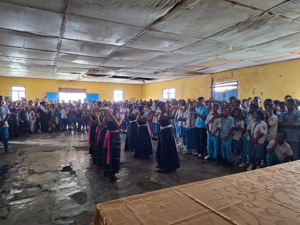
A traditional dance performance.
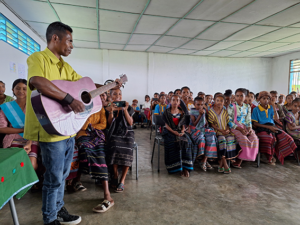
The gift of a guitar means so much to this community.
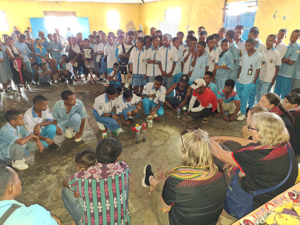
Senior students proudly showing us their science experiments using basic items.
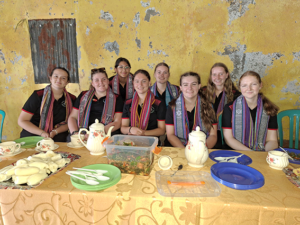
Bella Sellers, Sophia Hastie, Asmi Pathania, Chloe Davidson, Sienna Smith, Alice den Houting, India Van Berkel, Ella May.
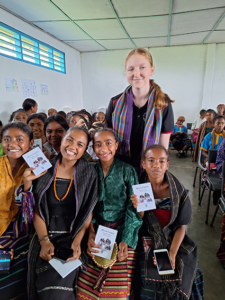
Ella giving out the much-appreciated gift of a dictionary.

A traditional warm welcome.
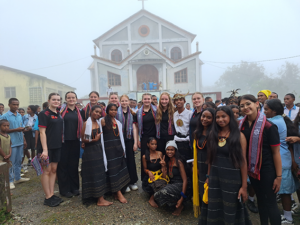
Our students connecting some of the Ponilala locals.
Teachers: Kirsten Enders, Andrea Heard, Jan Park.
Students: Ella May, Asmi Pathania and India Van Berkel
TRARALGON CAMPUS ENSEMBLE REHEARSAL SCHEDULE
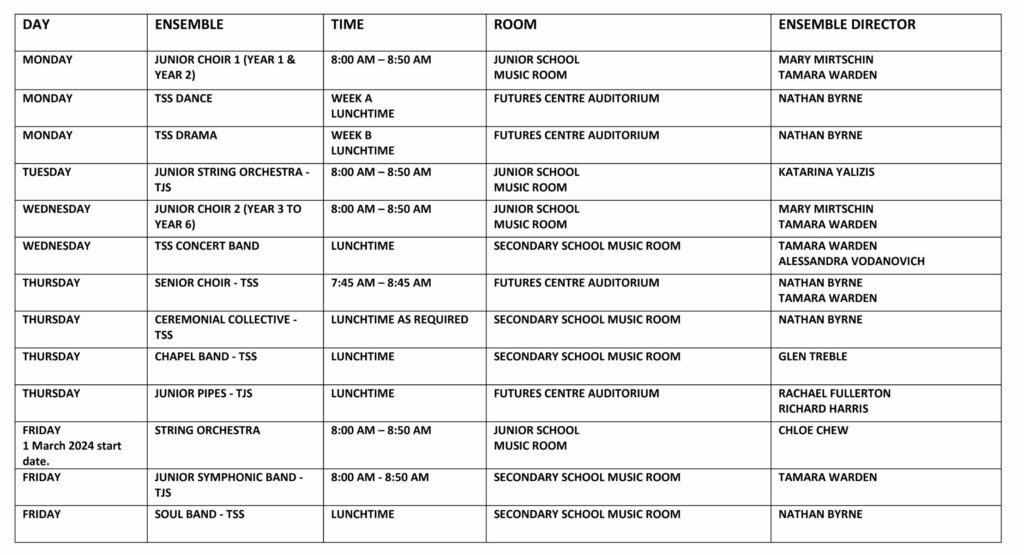 New members, including students receiving tuition outside of school, are most welcome. Please contact Mrs Heather Mason, and/or the listed ensemble director for further information hjmason@stpaulsags.vic.edu.au .
New members, including students receiving tuition outside of school, are most welcome. Please contact Mrs Heather Mason, and/or the listed ensemble director for further information hjmason@stpaulsags.vic.edu.au .
Heather Mason
Head of Performing Arts – Co-Curricular
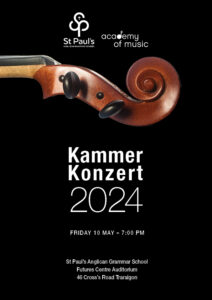
ALUMNI REUNIONS
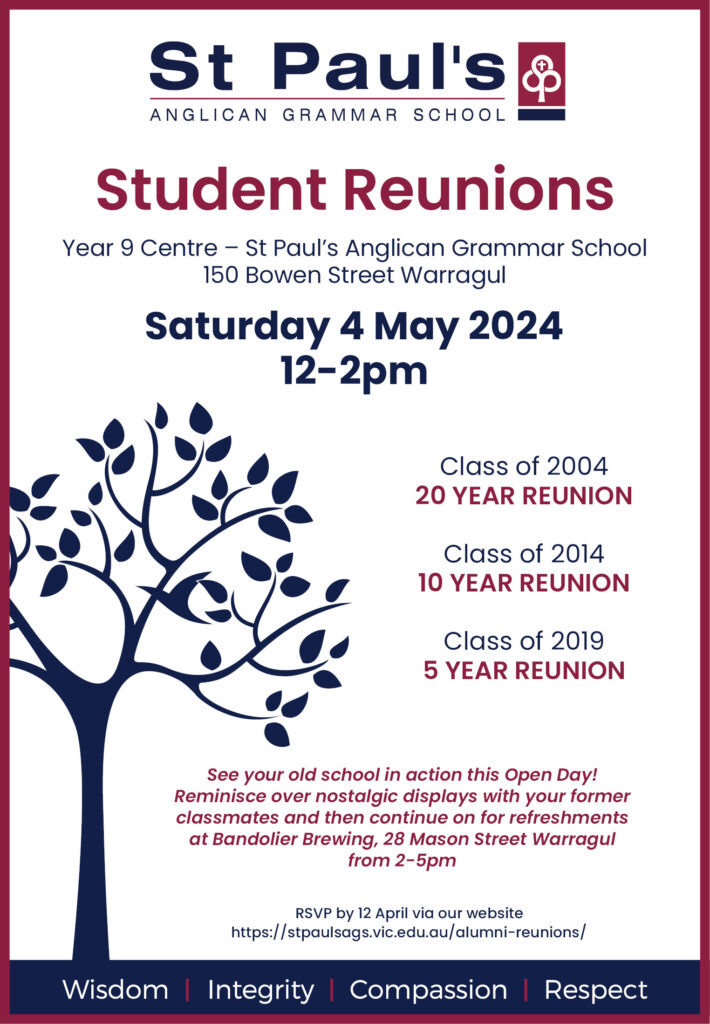
Saturday 4 May 2024
Year 9 Centre, St Paul’s Anglican Grammar School, 150 Bowen Street Warragul
• Class of 2019 – 5 Year Reunion
• Class of 2014 – 10 Year Reunion
• Class of 2004 – 20 Year Reunion
This year we have brought forward the timing of our Alumni Reunions to coincide with the school’s annual Open Day. Moving the reunions earlier provides us with a wonderful opportunity to celebrate and tour the school in action, see how it has changed and meet some of the current St Paul’s students and staff. Please join us at any stage between 10:00 am and 2:00 pm, chat with our Alumni representatives and reminisce over the range of memorabilia on display. You might also like to join the Alumni school tour which will take place at 12:30 pm, before continuing your celebrations with some drinks, nibbles and catch-ups at Bandolier Brewing, 28 Mason Street Warragul, from 2:00 pm to 5:00 pm.
Please RSVP by completing the registration here.
Michelle Ireland
Community Coordinator
alumni@stpaulsags.vic.edu.au
FROM THE FINANCE OFFICE
Private Car Conveyance Allowance
Families driving students more than 4.8 kilometres to attend St Paul’s Anglican Grammar School may be eligible to receive a conveyance allowance. For further information on the eligibility criteria and application process, please refer to https://www2.education.vic.gov.au/pal/conveyance-allowance/policy
Eligible families applying for the car conveyance allowance will have funds credited to their fee account during the year. If the fee account has been paid in full, or is on a direct debit arrangement, any allocation will show as a credit on the following year’s invoice.
The Camps, Sports and Excursions Fund (CSEF)
The Camps, Sports and Excursions Fund (CSEF) provides payments directly to the school for the benefit of the eligible student to attend camps, sports and excursions. Families holding a valid means-tested concession card or temporary foster parents are eligible to apply. $125 per year will be paid for eligible primary school students and $225 per year paid for eligible secondary school students. Payments will go directly to the school and be tied to the student. For more information and to download the application form please go to https://www2.education.vic.gov.au/pal/camps-sports-and-excursions-fund/resources
Parents are encouraged to lodge the application form immediately. The CSEF program for 2024 closes at the end of Term 2. All forms must be received by 24 June 2024 to be processed.
For parents who received CSEF at the school in 2023 (and the student/s are still enrolled in 2024), the schools will ‘copy’ the application across from 2023 to 2024 on the CSEF system. The CSEF system will automatically validate the parent’s eligibility with Centrelink.
